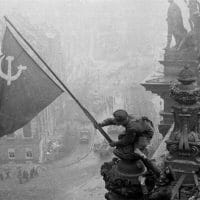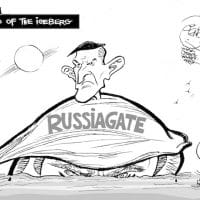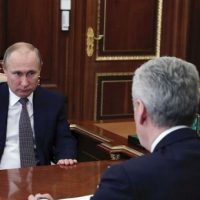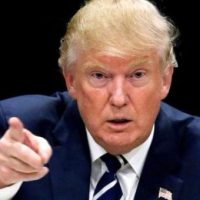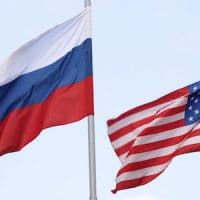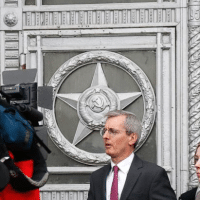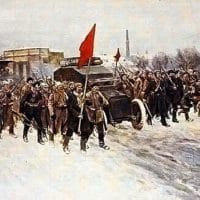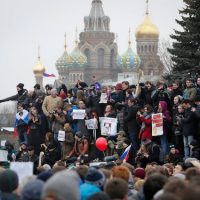-
U.S. fake World War 2 history underlies permanent bipartisan hostility toward Russia
There’s fake news. And then there’s fake history. Fake news lies about the world as it is. But fake history is the context for fake news. Fake history sanctifies abominations past and present. Fake history erases the struggle over thousands of years between those many who produced the planet’s wealth and the greedy few who appropriate it for themselves.
-
Why Russia is growing gold reserves to record levels
According to Russian Central Bank figures, Russia’s total gold reserves amounted to 1,944 tons as of June 2018, with the regulator pointing to a steady rise in holdings of the precious metal over the last decade (total gold reserves amounted to less than 500 tons in 2008). In the same period, the share of gold in Russia’s total reserves grew from just 2.5 percent to over 17 percent.
-
Making excuses for Russiagate
As months turn into nearly two years and no solid evidence emerges to nail Russia for nabbing Election 2016, some big Russia-gate cheerleaders are starting to cover their tracks, as Daniel Lazare explains.
-
Karl Marx: forgotten man in Russia
Two hundred years after his birth, a handful of Russian academics want Karl Marx to be a household name.
-
Brzezinski’s ghost shapes Washington Eurasia geopolitics
Contrary to a widely-held belief that U.S. President Trump acts only out of impulse or is being unpredictable, I believe that the opposite is the case.
-
The Samson haircut option
At the start of April President Vladimir Putin believed he could postpone Russia’s strategic and battlefield responses to the state of war which the U.S. is escalating. He was to be disappointed.
-
Corbyn: UK needs ‘war powers act’ after legally questionable Syria strike
The British opposition leader said his country needs the war powers act to limit government’s control over military interventions.
-
Putin: U.S.-led attack on Syria violation of international law
The Russia president said Washington and its allies have used such strategies of unconfirmed reports to launch interventions against local governments.
-
Trump to Russia: get ready to shoot down ‘smart’ missiles
U.S. President Donald Trump says Russia should be prepared to shoot many missiles out of the sky because they will be “coming, nice and new and smart.” Trump tweeted early Wednesday saying Moscow was supporting a ‘gas killing animal.’
-
How the United States ‘hacked’ Russia’s elections in the 1990s
In a recent interview that went viral, Russian President Vladimir Putin repudiated NBC journalist Megyn Kelly, when she pressed him on the so-called “Russiagate” scandal.
-
Russia suggests UK possessed nerve agent that is “quite artificially” being linked to Moscow
Russian officials are voicing a full-throated dismissal of British accusations that Russia used a nerve agent referred to as “Novichok” in an attack on former Russian spy Sergei Skripal and his daughter Yulia. The Russian Ambassador to the U.K., Alexander Yakovenko, is further charging London with making accusations in poor faith, while raising questions over whether the poison was already in the possession of the British government.
-
Who will stop the U.S.-Russia arms race?
President Trump is drawing heat for congratulating Russian President Vladimir Putin on his re-election victory. During a phone call with Putin this week Trump reportedly ignored a written directive from his aides that instructed him, quote, do not congratulate. Speaking to MSNBC, Democratic Sen. Mark Warner echoed the outraged response from Republican Sen. John McCain.
-
Nervous about Russia
Two weeks ago in Salisbury, less than 10 kilometres from the UK’s Porton Down chemical weapons establishment, a Russian and his daughter appear to have been poisoned. Sergei Skripal was a former Russian military intelligence officer who acted as a spy for the UK’s MI6.
-
The Skripal poisoning: What lies behind UK-US ultimatums against Russia?
To those who say it is obvious that Russia poisoned Skripal, it is worth recalling the 2001 anthrax attacks in the United States, in which a deadly strain of anthrax was mailed to many U.S. officials in Washington, killing 5 people and infecting 17 more, shortly after the September 11 attacks. There again, media immediately blamed the attacks on obvious targets of U.S.-UK war threats—the Iraqi regime’s weapons of mass destruction (WMD) program and its alleged ties to Al Qaeda. These all proved to be lies, serving Washington’s foreign policy interests as it sought to go to war in Iraq.
-
Washington’s century-long war on Russia
The United States has launched a three-pronged offensive on Russia. First, it’s attacking Russia’s economy via sanctions and oil-price manipulation. Second, it’s increasing the threats to Russia’s national security by arming and training militant proxies in Syria and Ukraine, and by encircling Russia with NATO forces and missile systems.
-
Reds under the Bed
The British conservative media and party establishment are renewing their attempts to paint Jeremy Corbyn as a traitor. But given the failure of this approach in the past, why would they attempt it again?
-
Russian debt repudiation, 100 years on
One achievement of the Russian revolution that is often ignored is the fulfillment of a promise made by the Russian revolutionaries in 1905: that all debts contracted by the Tsarist regime that had been overthrown some eleven months earlier were cancelled.
-
Poll finds growing demand for reform in Russia
According to a survey by the Russian Academy of Sciences, 51% of Russians believe the country needs “significant reform” over “stability.” Though a small majority, that’s the first time “reform” has won out since before 2003, perhaps indicative of a changing political mood locally. Per the polling, the younger generation is the most pro-reform, with 62% in favor.
-
What the Russian Revolution proved possible
Nov. 7, 2017 marks the 100th anniversary of the seizure of power by workers and peasants in the Russian Revolution, regarded as the most world-altering event in the history of civilization.

